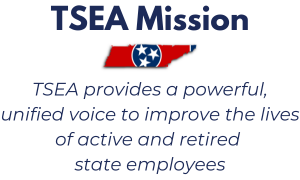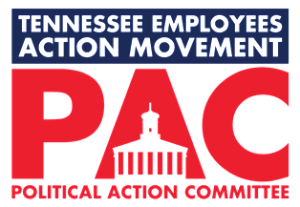The Senate yesterday passed a reduced state budget, which incorporates a multitude of cuts, including eliminating raises for state and higher education employees in the coming year.
We expect the House of Representatives will have a vote next week on their final budget, then any differences between the Senate and House budgets will have to be resolved before presenting a final budget.
As we reported last week, the latest budget presented by Gov. Lee anticipates a $500 million revenue shortfall in the state budget for the current fiscal year, and a $1 billion shortfall in fiscal year 2021. For the most part, the Senate’s budget mirrors the budget presented by Gov. Lee, with a few notable changes.
The Senate cut their legislative raises and other mandated raises from the budget. As you may know, many of the pay increases included in the governor’s proposed budget as presented last week are statutorily required, which means only the General Assembly has the authority to enact legislation to cut or eliminate those increases.
The governor’s raise, which considering our economic situation and the cuts being proposed has been very controversial, is tied to our state constitution and cannot be addressed by the legislature in one session. Governor Lee said he would donate his raise.
Roughly $20.1 billion of the state’s $39 billion budget are funded with state dollars, federal dollars fund 35 percent of Tennessee’s state budget. With a projected deficit of $1 billion of those state funds, you can begin to see the economic challenges we face.
Once there is a final budget presented for 2020-2021, each department has been requested to identify an additional 12 percent from their agency budgets. Also, all higher education institutions we have contacted are looking at various levels of cuts to departments to fill their budget deficits.
During Senate budget discussions, Finance Chairman Bo Watson, Senator Jeff Yarbro, and other finance committee members had a lengthy conversation about the necessity for additional legislative oversight to provide accountability for the Lee administration as they make decisions about agency reductions. The oversight provision is contained in Amendment 3 of the Budget Implementation Act.
TSEA is disappointed about the elimination of raises in the budget. Our dedicated state employees have continued to keep Tennessee operating through the COVID-19 pandemic, providing uninterrupted services to our citizens, with many employees working on the front lines. TSEA advocated for employees and proposed several ideas to the Lee administration and your legislators, including contingency raises. Still, the economic outlook is not compatible with an increase at this time.
COVID-19 has been an unprecedented and unexpected event in our history. The impact on our economy has been significant, requiring the Lee administration to propose three budgets this year, each with deeper reductions than the previous version.
While we are disappointed by the elimination of raises, we are grateful to Department of Finance and Administration Commissioner Butch Eley, members of his F&A staff, and the General Assembly for developing a plan to navigate these unexpected economic challenges while avoiding mass layoffs and benefit reductions for state and higher education employees.
Our economy will bounce back. And when it does, TSEA will be here to remind your legislators and the governor of your professionalism and dedication to providing uninterrupted services for our citizens during the COVID-19 pandemic, and that part of the efforts to balance the budget included state employees foregoing their raises.
There are a few positives from the Senate budget:
- $50 million is allocated for an employee buyout program. DOHR is still developing this program, but the program would likely provide
employees in identified positions a minimum of $3,200 (potentially more based on years of service), two years of college tuition assistance, and extended health insurance benefits.
- Fully funding the state’s increase in health insurance premiums for state and higher education employees (the state pays 80 percent of your insurance premiums)
- Fully funding state and higher education employees’ TCRS increases for this year (Retiree COLA)
- Continuing the $50 match on the 401(K) for state and higher education employees. As a reminder, the law only requires a $40 match, so we thank the governor and state legislature for continuing the match at the current rate.
As we mentioned above, next week the House will likely take up their budget. We will keep you up to date as that happens.
Thank you for all you do serving the citizens of Tennessee and for your membership in TSEA. We will continue to support and advocate for you at every turn.















